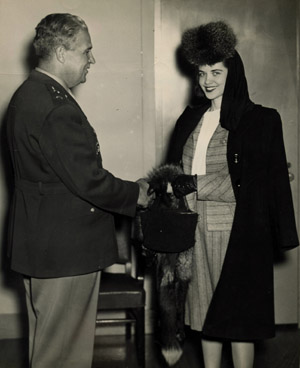On April 25, 2012, Patricia (Patty) Cox Owen, who served under General Leslie Groves in the Manhattan Project, passed away. Born on March 31, 1925 in Cedar Rapids, IA, she was 87. Ms. Owen was a member of Groves’ inner sanctum. Immersed in the top-secret Manhattan Project, she kept mum about her work for most of her life, leaving behind a few choice stories of her work on the Project.
General Groves was a tough taskmaster and had already gone through more than a dozen secretaries. When he interviewed Patty in 1942, she was only 18 years old. Groves made it clear that she would have to work hard to measure up to his exacting standards. Dutifully, Ms. Owen threw herself into her work.
The headquarters of the Manhattan Project were in a suite of offices on the fifth floor of the New War Building on 21st Street and Virginia Avenue, NW, Washington, DC. Patty soon found herself in the center of the action. Her desk was immediately outside Groves’ office and next to Mrs. Jean O’Leary, General Groves’ personal secretary. Mrs. O’Leary was a widow in her early thirties and mother of a young boy. She was as tough, hard-working, and determined as Groves himself.
Despite their age difference, the two women quickly became friends, a friendship which lasted a lifetime. Mrs. O’Leary was probably especially comforting when Patty lost both her beloved brother, a navigator in a bomber downed over the Mediterranean in June 1943, and her father at about the same time.
Patty reported to Col. William A. Consodine, who was deputy to John Lansdale, Groves’ chief security and counterintelligence officer. Secrecy was of utmost importance. Patty never even told her husband the secrets of her work on the Manhattan Project, long after the war was over.
While her job description read, “Clerk-Steno,” the classification sheet completed by her supervisor in 1945 suggests the magnitude of her responsibilities by the end of the war: “Under general supervision of a Colonel but with wide latitude of independence of action and decision, incumbent performs numerous varied duties in a position which requires great responsibility and tact.” Not only did she take and transcribe top-secret memos for the Secretary of War, she was responsible for the confidential funds in the Washington office, “the amount of which cannot be stated for security reasons.”
Her other duties included “endeavoring before August 6, 1945, to keep out of the press and off the radio any reference to nuclear physics, atomic energy, atomic bomb, and sundry allied subjects; after August 6, 1945, to limit the use of information so as to protect the various secrets of the atomic bomb and the release of atomic energy and yet aid in the release of unclassified information…In many instances the incumbent diverts a dangerous query, persuades the author not to use it, and gives the author another idea as yet untouched by the press and radio.”
Ms. Owen’s son, Don Owen of Bethesda, MD, recently provided the Atomic Heritage Foundation access to his mother’s collection of Manhattan Project memorabilia. The collection includes many gems, from photographs of Groves to World War II newspaper clippings. Ms. Owen had typed up some “Later Remembrances” of her time in Groves’ office. Here are a few choice excerpts.
“One day I called in ‘sick’ and was told ‘You get yourself down here right away. You don’t get sick in wartime!’ We had our own General Pattons right here.”
“Col. Consodine said to me, ‘Do you know that if we hadn’t been successful what would have happened? They (the enemy) would have taken every one of us out of here and shot us dead! I also shudder to think what the Congress would have done—with their investigation of what happened to two billion dollars!’”
“I, of course, knew that the bomb was going to be dropped. Consodine told me the day before [August 5], ‘Get out on the street early, Toots (This makes me sound like a floozy, but it was a term of endearment to him.) and get a paper!’ That morning, Claude [Ms. Owen’s boyfriend and future husband] drove over and while he was trying to tell me that he had something for me, I was interrupting him and saying, ‘Quick. We’ve got to go get a newspaper. I can now tell you that you are NOT GOING TO THE PACIFIC!’ He thought I was nuts and kept trying to say he knew he had to leave but wanted to give me a ring first and I couldn’t even hear him. The news to hit the street was foremost in my mind and the unbearable suspense was paramount in my thinking at the time. What’s an engagement ring?!”





